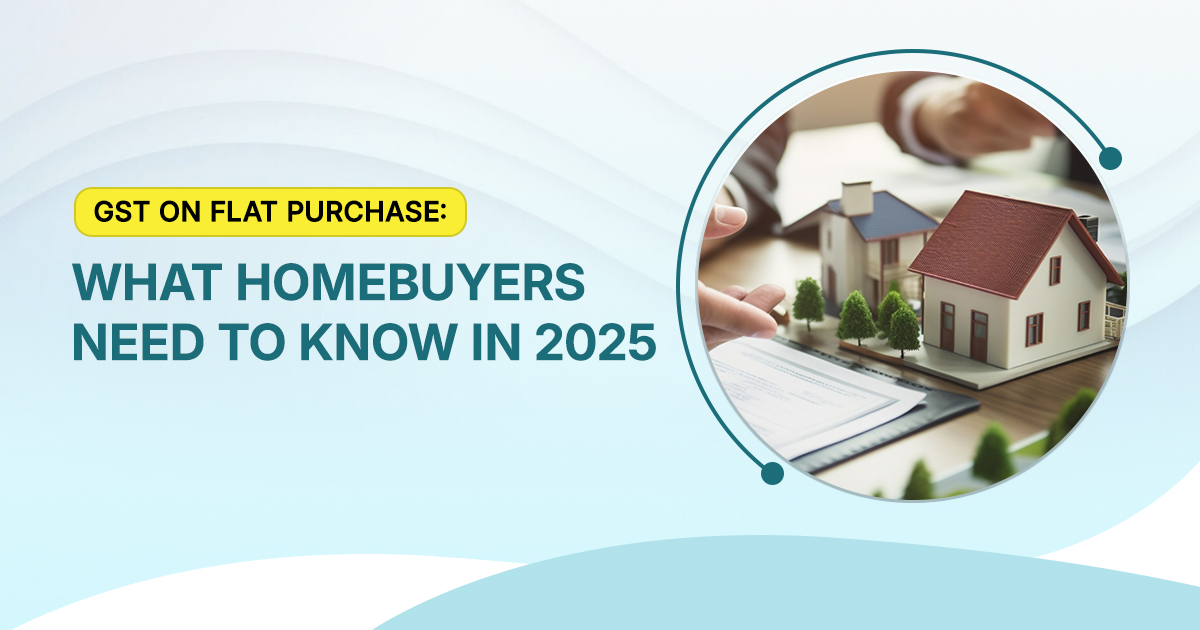Table of Contents1. Introduction 2. What is GST and How It Applies to Property 3. GST on Flat Purchase in 2025 4. GST on Under-Construction vs Ready-to-Move Flats 5. When GST is Not Applicable 6. How GST Affects Homebuyers 7. Conclusion |
|
Are you planning to buy a flat in 2025? One important thing you should know about is the GST (Goods and Services Tax) which is applicable on property purchases. For most homebuyers the total price of a flat can be confusing because it includes different charges one of which is GST.
But not every property is taxed the same way. In fact, depending on whether it’s an under-construction property or a ready-to-move-in flat the tax treatment changes. That’s why understanding GST on flat purchases is very important before you sign any deal.
This guide breaks it all down for you in simple language, so you don’t get lost in legal terms.
What is GST and How It Applies to Property
Goods and Services Tax (GST) is a tax system introduced in India in 2017 to replace multiple indirect taxes like VAT, service tax and excise duty. It applies to both goods and services including construction services.
In the real estate sector, GST is charged on the construction of properties that are still being built. That means when you buy a flat directly from a builder and it’s under construction GST is added to the price. But if the flat is already completed and has received an Occupancy Certificate (OC) GST is not charged.
In simple terms:
-
➤If you’re buying a flat that’s still under construction → GST applies
-
➤If the flat is completed and ready to move in → No GST
So knowing the construction status of the property is important to avoid paying extra.
GST on Flat Purchase in 2025
As of 2025, the GST rules for residential property purchases are as follows:
1% GST for Affordable Housing
This applies if:
-
The carpet area is up to 60 sq. meters in metros or 90 sq. meters in non-metros
-
The cost of the flat is ₹45 lakhs or below
5% GST for Non-Affordable Housing
For all other under-construction residential flats that don’t meet the affordable housing criteria.
No Input Tax Credit
Builders cannot claim back taxes paid on materials used for construction (known as Input Tax Credit or ITC). This rule has been in place since April 2019 and continues in 2025.
So if you’re planning to book a flat in 2025 that is still being constructed make sure to calculate this additional 1% or 5% GST over the basic flat cost.
GST on Under-Construction vs Ready-to-Move Flats
Let’s compare the two clearly:
| Type of Property | GST Applicable | Rate |
|---|---|---|
| Under-construction (affordable) | Yes | 1% |
| Under-construction (others) | Yes | 5% |
| Ready-to-move-in flat | No (if OC received) | 0% |
So if you’re booking an under-construction flat in 2025 GST will be charged by the builder. But if the project is complete and has received an Occupancy Certificate (OC) you won’t have to pay any GST.
That’s why many buyers prefer ready-to-move flats even if they cost slightly more to avoid the extra tax.
When GST is Not Applicable
There are specific situations where you don’t need to pay GST on a flat purchase:
-
➤ The flat is completed and has an Occupancy Certificate
-
➤ You’re buying a resale flat (a second-hand flat from a previous owner)
-
➤ The builder has already completed construction before you signed the agreement
-
➤ Certain government-subsidized housing schemes may also be exempt
It’s similar to how GST works for other used items. For example, in the automobile market buyers check gst on sale of old car or gst on sale of used car to know how much tax applies. Just like that GST for properties depends on whether it’s new or already owned.
How GST Affects Homebuyers
For homebuyers, GST can affect both your short-term and long-term costs. Here’s how:
1. Higher Upfront Cost
You will need to pay GST along with the flat’s base cost. So, if you’re buying a ₹50 lakh flat the GST could be ₹2.5 lakhs more (at 5%).
2. No Tax Benefits on GST Paid
You won’t get any refund or deduction for the GST you paid; it's a non-refundable cost.
3. Impacts Budget Planning
The final price you pay for the flat includes base price, GST, stamp duty and registration so your budget should account for all of these.
4. Influences Property Choice
Some buyers prefer ready-to-move flats even if they’re slightly more expensive to avoid GST.
Conclusion
Buying a home is one of the biggest financial decisions of your life. That’s why understanding GST on flat purchase is so important.
In 2025, GST is only applicable on under-construction flats at 1% for affordable housing and 5% for other flats. Ready-to-move-in flats are exempt if the builder has already obtained an Occupancy Certificate.
Always ask your builder or agent about the GST status before booking. Knowing these facts not only helps you plan your budget better but also helps you avoid surprises later. Whether you're a first-time buyer or upgrading your home, being aware of taxes like GST ensures that you're making a smart, informed investment.
Related Topics:
• GST Filing Dates 2025: Monthly, Quarterly & Annual Guide
• Avoid These Mistakes in GST Registration Procedure Under GST Notes

